- Vocations
Vocation Questions
Frequent Vocation Questions
Below are common questions about vocations. If you have other questions, please contact our US Provincial Headquarters.
Are there any particular characteristics that would facilitate a vocation to the Institute of Christ the King Sovereign Priest?
If you feel a strong call to serve Christ the King generously with your whole life, and you want to be a faithful son of Holy Mother Church and the fullness of Her grand tradition in all aspects of life, then you may be called to look deeper into a vocation with the Institute.
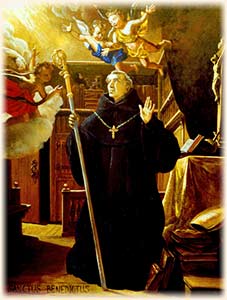 St. Benedict, one of our patrons
St. Benedict, one of our patronsWe want you to develop a filial devotion to the Blessed Mother under her title of the Immaculate Conception, which will help you to develop the purity, humility, and obedience that you need in your life as a priest or oblate. You should have a certain spiritual attraction for our three patron saints: St. Benedict, as the symbol of unity between faith and culture, liturgy and life; St. Thomas Aquinas, as the beacon of fidelity to the Church's doctrine and the papacy; and St. Francis de Sales, as the gentleman priest of an ever-growing love for those in material and spiritual distress.
As a priest or oblate in the Institute, you should cherish the fraternal community life, which is focused on the glory of God in the liturgy and on a truly selfless charity, beginning within the very houses of the Institute.
If you are eager to learn and grow in spirituality and in understanding of the treasures that the Church offers through Her liturgy, doctrine, and life in the world, and if you want to be docile to the rich graces flowing from obedience and humility in receiving these treasures from the wisdom of the Church, then Christ the King, the Eternal High Priest, may wait for you to become a future member of our Institute.
How is the Institute at the service of the Church's history and tradition?
The mission of the Church is to continue throughout history the teaching of the eternal truths taught by its divine Founder and handed down in an unbroken tradition from the Apostles and their legitimate successors. It is this unbroken tradition which, under the guidance of the Holy Ghost, guarantees our union with Jesus Christ who was, is, and always will be (Heb 13:8). The Institute desires to be in perfect continuity with this authentic, unbroken tradition. The founder and co-founder of the Institute, through their ecclesiastical studies in Genoa under the late Cardinal Giuseppe Siri and in Rome, where they served Cardinals and clergymen representing the great Roman school in its unbroken tradition, had the grace to be immersed in an unbroken stream of tradition. Thus, they do not seek to recreate Catholic tradition, but simply to pass it on to the members of the Institute. This is living tradition in its true sense tradidi vobis quod et accepi ("I pass on to you that which I have myself have received") (I Cor 11:23).
Does the Institute have its own seminary?
Yes. You may learn more on the International Seminary page.
Does the Institute of Christ the King have a formation house in the US?
Due to the ever-growing number of young American men that join the formation program as seminarians or oblates, the Institute has already implemented for the past several years now a special pre-seminary program which prepares these young men for entry into our International Seminary near Florence, Italy. This pre-seminary program is located at several of our apostolates throughout the United States. The American candidates for the oblatehood are also all trained in our American houses.
Must members of the Institute of Christ the King learn languages?
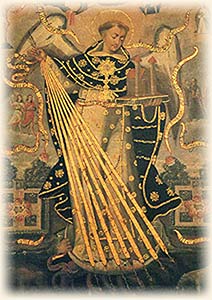 St. Thomas Aquinas, one of our patrons
St. Thomas Aquinas, one of our patronsYes. Every candidate to the priesthood in the Institute must learn or know at least two languages other than his own. For those who speak English, these include Latin and French.
While it is certainly beneficial to know already at least some French and Latin before entering the Institute of Christ the King, this is not a necessary requirement, since our one year pre-seminary program offers training in both of these languages if needed. In the first year, together with the spirituality of the Institute and the experience of the community life, the focus is mainly upon the French language, which is taught by professional teachers. This year also includes study in the Latin language, which is continued throughout the seven years at the International Seminary of the Institute.
It is our experience that no one with a genuine vocation to the Institute of Christ the King has ever had difficulty with these requirements. The learning of an additional modern language is a great opportunity for a deeper understanding of Catholic culture, and we are proud to say that those coming from the United States are among our most proficient Latinists.
What are the requirements for entering the seminary or oblatehood?
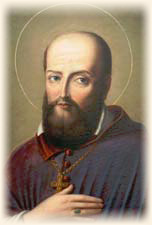 St. Francis de Sales,
St. Francis de Sales,one of our patrons
The conditions for entering the formation program to the priesthood and oblatehood are the following:
- normally, prospective seminarians should be between the ages of 18 and 30, while prospective oblate candidates should be between 18 and 40
- high school diploma or equivalent, and/or working experience
- two-page resume, which includes date of birth, main schooling and working experiences, and a photograph to be submitted to our US Provincial Headquarters
- letters of recommendation from at least two priests
After these requirements have been fulfilled, prospective candidates may email our U.S. Provincial Headquarters in Chicago to contact the vocations director.
Can a lady become a member of the Institute?
The Institute has a female branch called the Sisters Adorers of the Royal Heart of Jesus. The Sisters' motherhouse is located about three miles from the motherhouse of the Institute in Gricigliano, near Florence, Italy. The fourteen sisters form a mixed community made up of French and Americans. This brings a great cultural richness to their life as sisters. They follow the spirituality of St. Francis de Sales, St. Jane Francis de Chantal, and St. Madeleine Sophie Barat. Their community life resembles very much the early inspiration of St. Francis de Sales for the Order of the Visitation.
Our sisters are not cloistered, but contemplation forms the principal part of their daily life. They chant Lauds, Vespers, and Compline, and assist at Holy Mass daily. In addition, the sisters have an hour of meditation before Mass as well as a holy hour of Eucharistic adoration in the evening. They are also called to be involved in apostolic endeavors. In the future, our sisters will serve the Lord by caring for liturgical vestments and altar linens, in addition to having a special apostolate for female youth.


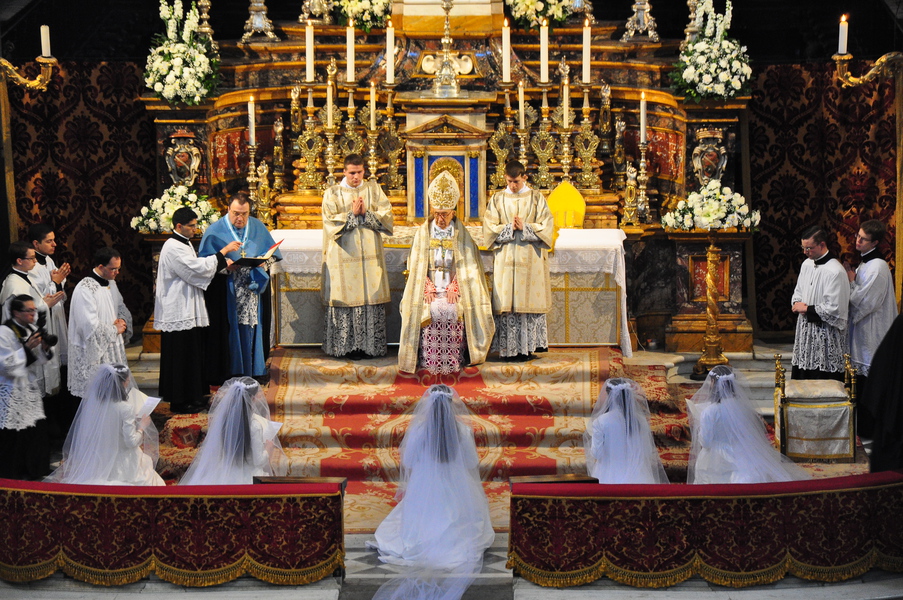
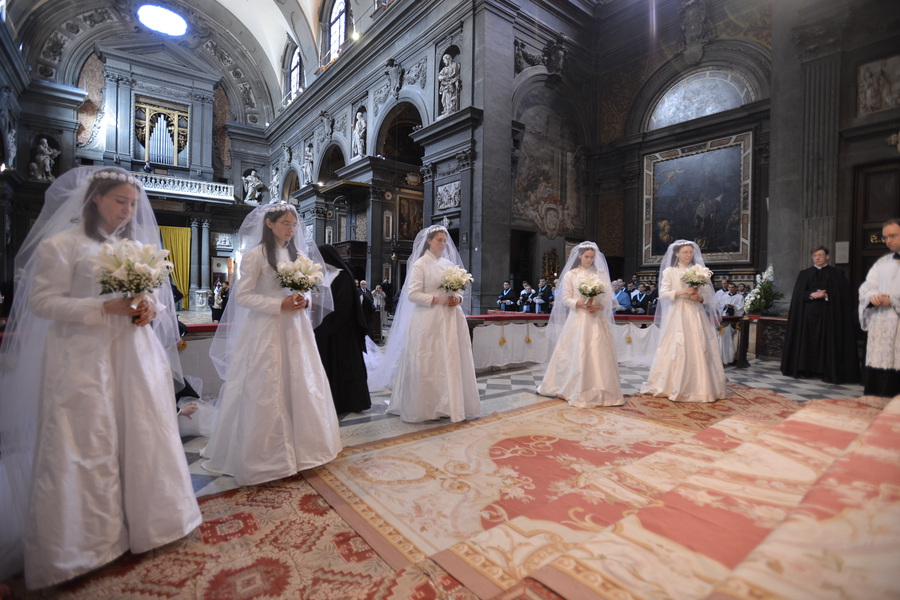
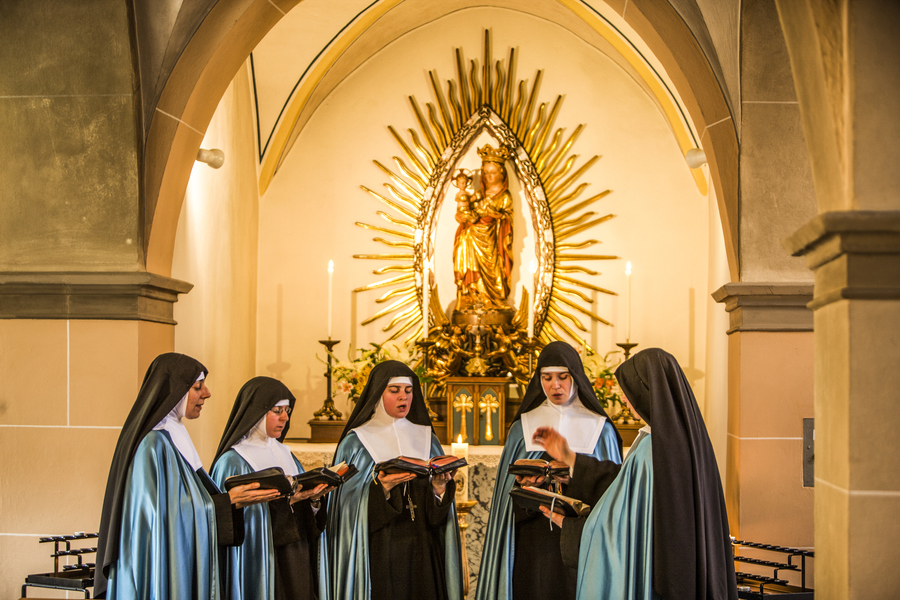 The sisters
The sisters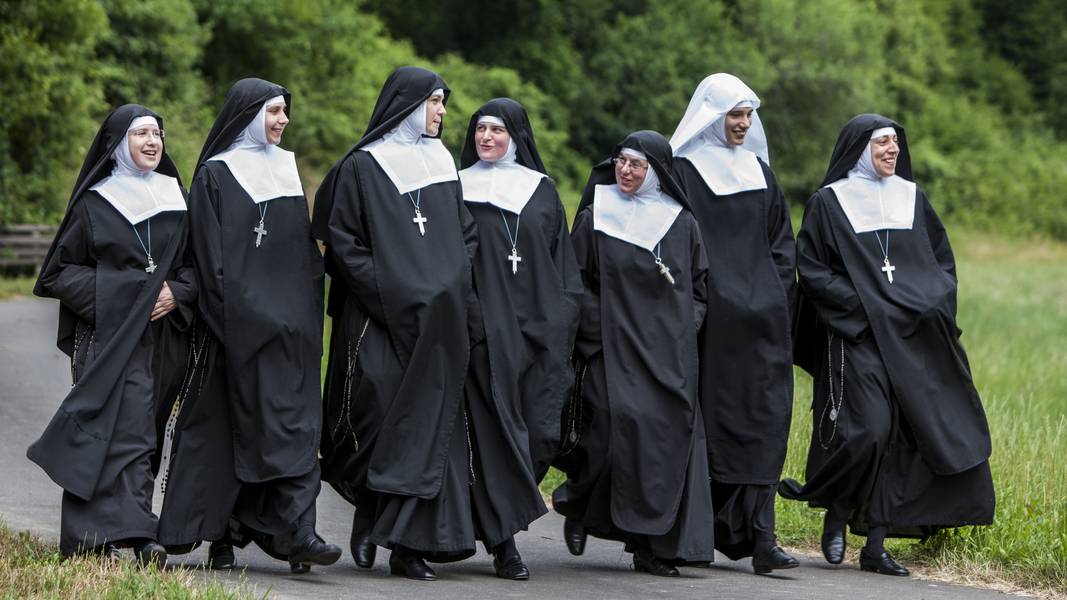 Sisters during recreation
Sisters during recreation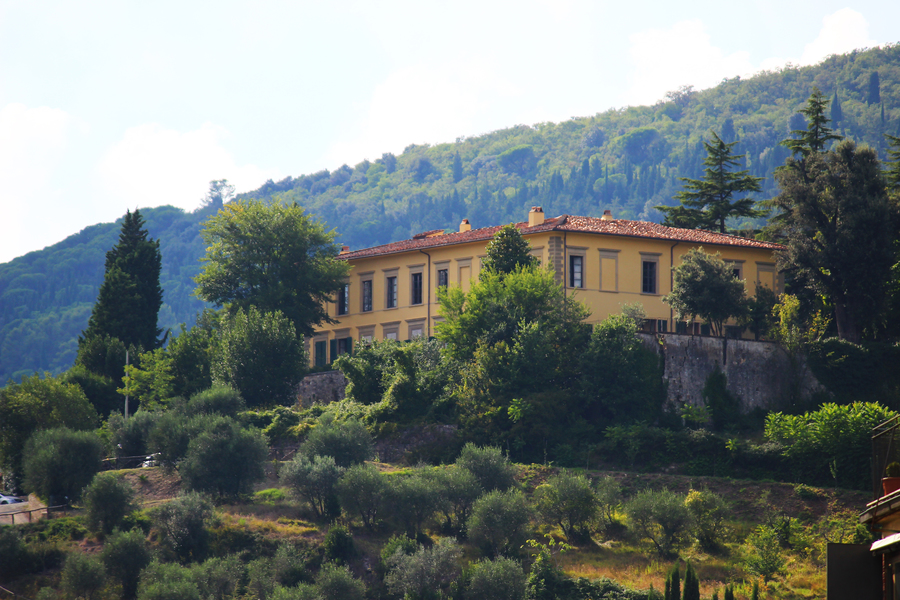 Convent
Convent Postulants with their fathers before Vestition Ceremony
Postulants with their fathers before Vestition Ceremony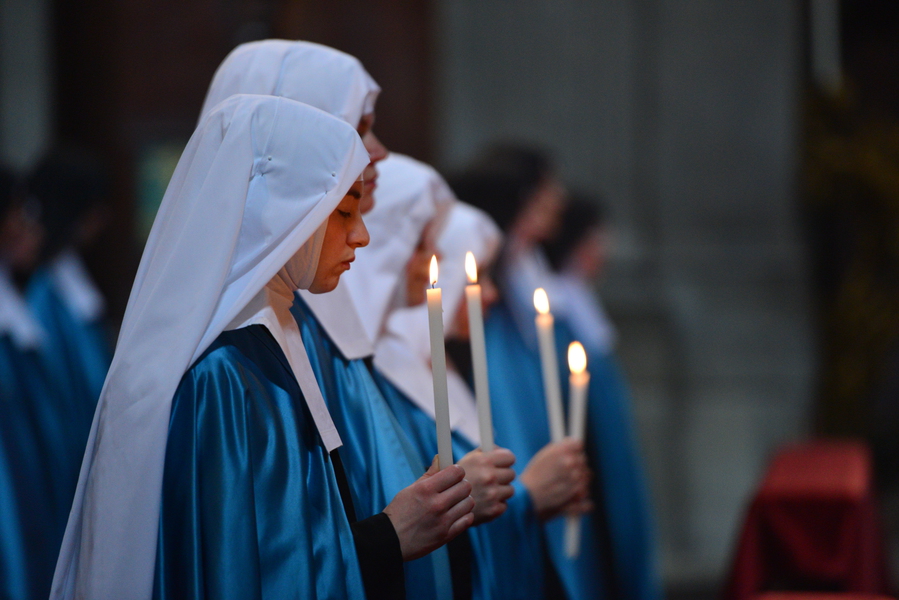 Sisters newly vested in their habit
Sisters newly vested in their habit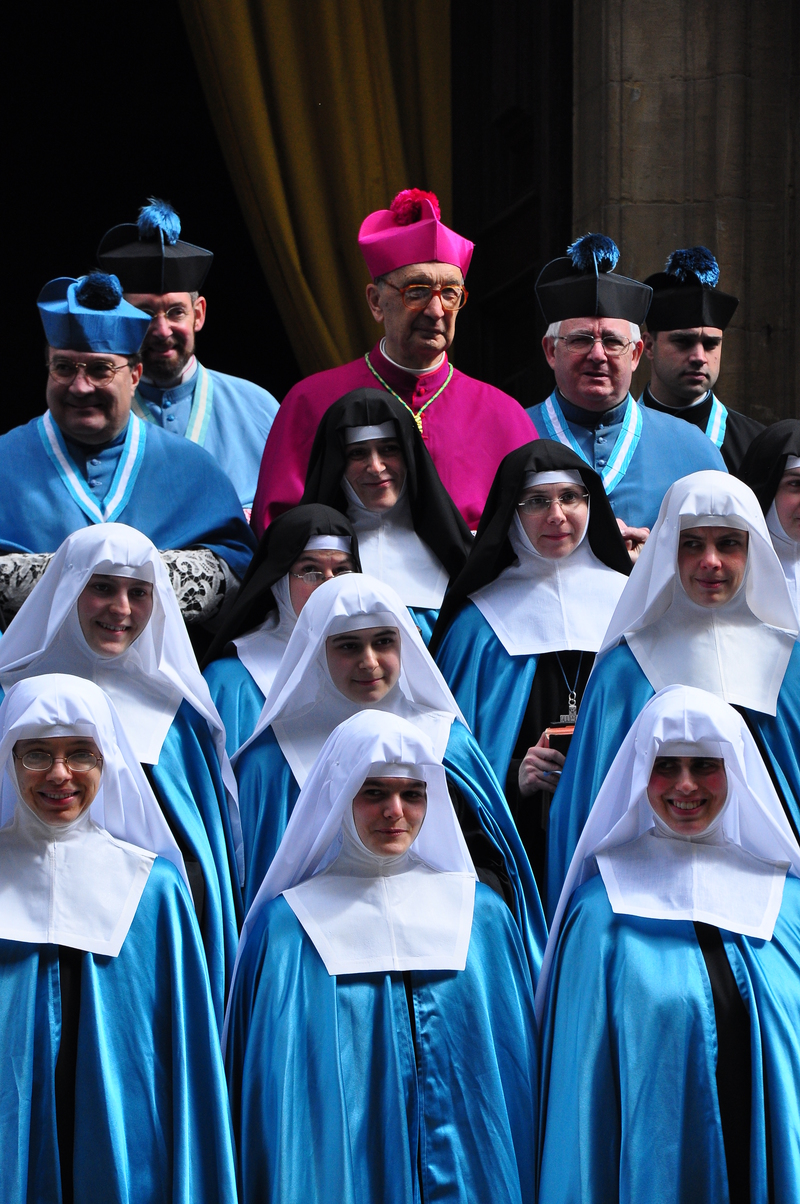 Sisters with the Superiors of the Institute
Sisters with the Superiors of the Institute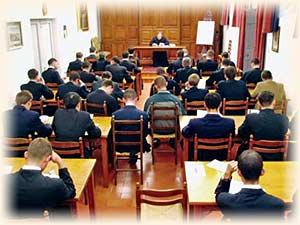 Seminarians during their studies
Seminarians during their studies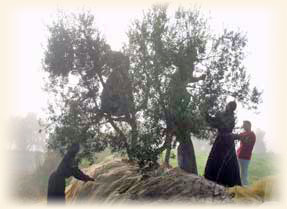 The olive harvest at our seminary
The olive harvest at our seminary A break for a game of soccer
A break for a game of soccer Seminarians gathered for prayer
Seminarians gathered for prayer



